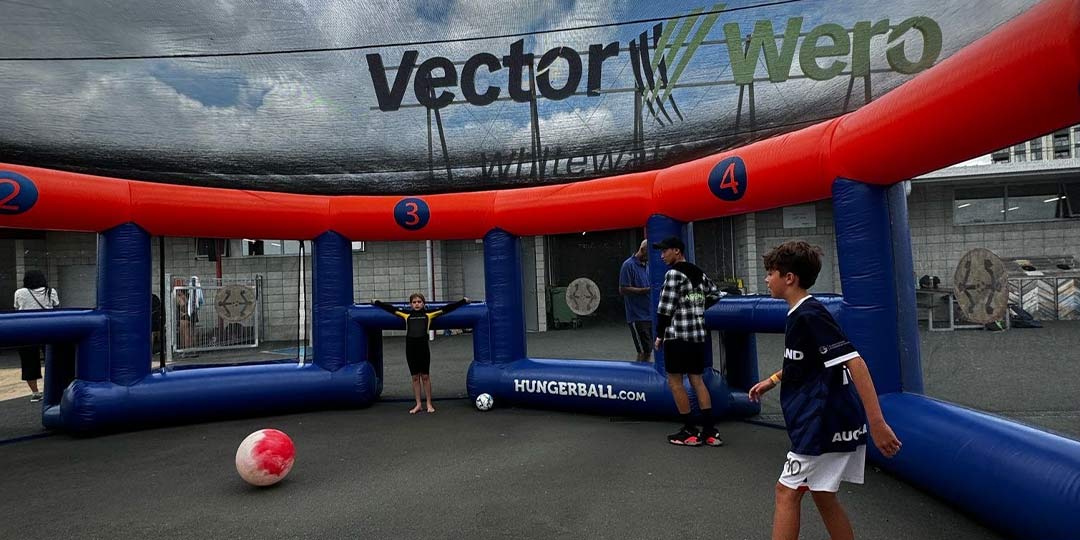HUNGERBALL is quick-fire, engaging, and relevant for Field of Dreams kids.
The John Walker Find Your Field of Dreams Foundation has invested in six HUNGERBALL arenas so South Auckland schools can play the fast, fun, and infinite game for longer at no cost. Field of Dreams general manager Rick Pickard says HUNGERBALL is huge for the organisation. “Now, we’re putting more than 20,000 kids through the game yearly. It’s grown exponentially.”
When Rick first heard about HUNGERBALL CEO Andu Iordache, he believed in the programme so much that he raised $25,000 within 24 hours to kick off the game in South Auckland. What appeals to Rick is that it’s inclusive for all abilities and not only about getting into the inflatable arena and having fun.
“There are all the learnings that go with HUNGERBALL – it’s quick-fire, it’s engaging, and it’s relevant, it’s now. There’s no sitting around waiting – it’s boom, boom, boom.”
On the most recent aquatic day for youngsters with disabilities, Rick watched a blind child spend almost the whole day playing in the arena. “He absolutely loved it, and it was absolutely brilliant.”
Money is always a barrier for the Auckland schools Field of Dreams works with, and all the charity’s programmes are free for the child, school, and parent. When they launched the new HUNGERBALL programme, it was the beginning of the challenging economic climate, when funding was hard to come by. Finding a cost-effective programme that delivered benefits to the children was essential.
Field of Dreams programmes and operations manager Danielle Strom says the cost to put each child through the game, that is, the number of children able to play while achieving excellent outcomes, makes HUNGERBALL one of the most successful Field of Dreams programmes.

Rick participated in a study by Dr Richard Wright of AUT’s School of Sport and Recreation investigating HUNGERBALL’s social return on investment (SROI). AUT’s SROI research validated Andu’s idea that there is more significant potential for enrichment if the arena stays at schools for longer periods so children have more exposure to the game.
Rick and Danielle thought so highly of HUNGERBALL that they bought six arenas. This will allow them to take it to more schools longer and enable teachers to plan when they will have it throughout the term.
The arenas rotate around South and some West Auckland schools for five weeks at a time, at no cost to the school.“Field of Dreams removes all barriers to kids, and we have more than 60,000 children in our programmes,” Rick says.
“Cost is the biggest barrier for most of our kids to doing most things. We believe in equal opportunity, and that’s what we provide for the kids.”
He sees HUNGERBALL as a physical education lesson, a health lesson and a holistic experience that includes sharing and caring, winning and losing, moving – going out and coming in when you have to.
“We need to get our kids moving, and it’s a fun way to get them active.”
Some teachers may be reluctant to take children out of the classroom because they don’t have control, but HUNGERBALL creates a controlled and engaging environment. Before a school gets an arena, HUNGERBALL operations manager Harsh Thaker and the team of trained coaches provide professional development for teachers so they know how to get the maximum experience from the multiple games for their students.
In some schools, students own the game and are included in training. They learn how to manage the games, and once they gain experience, they may create new versions of the game. Having teachers and students as skilled coaches increases the school’s capacity to use the arena and gain greater benefits from the educational tool, covering endless learning experiences for students.
Several schools developed a physical education programme during the five-week programme with interclass and interschool competitions. Students developed strategies, improved numerous physical skills, and had fun getting fit. Field of Dreams allows schools to use the arena for community events, such as gala days and fairs, which can be an added fundraising bonus.
Field of Dreams prefers to provide sustainable and continuous activities, and some schools have identified higher student attendance when HUNGERBALL is present.
“Some of our South Auckland kids are not exposed to a whole of different experiences, and our mission statement is to provide a lifetime of opportunity. HUNGERBALL is another one of our tools for doing that.”
It has proved so popular, one school asked Rick if they could keep the arena all year round. Rick and Danielle regularly meet with Andu to discuss and review how the programme is going, and they have built an excellent relationship throughout the years. “Andu is in it for the right reasons,” says Rick. “He’s not going to deny anyone, even on the odd occasion when a school hasn’t got the money for HUNGERBALL. While this is Andu’s business – it’s his passion – and he sees the benefit of the programme for all children, which makes a difference.”







